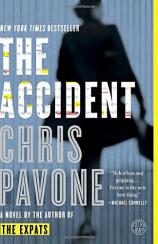Excerpt
Excerpt
The Accident

He awakens suddenly, in terror. He spins his head around the spare room, searching the darkest shadows in the blue wash of moonlight, sitting bolt upright, head cocked, alert for noises. He reaches his hand across his body, and grabs the gun.
As he becomes less asleep, he realizes what woke him. The gun won’t help. He returns the weapon to the end table, next to the ever-present water bottle. He swigs, but his stomach is roiling, and it takes a couple seconds before he manages to swallow.
He walks to the end of the hall, to the room he uses as an office. Just a desk and a chair in front of a window. The reflection of the moon shimmers in the Zürichsee, a block away from this Victorian pile of bricks and wrought iron, covered in blooming wisteria, its scent spilling through the windows, seeping through the walls.
He jiggles the mouse to wake his computer, types in his password, launches the media player, and opens the live feed of streaming video. The camera is mounted high in a darkened room, focused on a woman who’s lying in bed, reading. She takes a drag of a cigarette, and flicks her ash into a big glass ashtray.
He looks away from the invasive image on his screen to a small keypad mounted beneath the desktop. He punches buttons in rapid succession, and with a soft click the drawers unlock.
He pulls out the stack of paper, bound by a thick green rubber band. He turns to a page one-third of the way through, and scans the text to identify the scene.
He flips forward ten pages, then five. Then back two. He runs his finger down the page, and he finds it, there on page 136, just as his mind’s eye pictured it, in his sleep in the middle of the night. One word. One letter.
I.
He thought he’d caught every one.
This current draft of the manuscript is the third; it will also be the final. For the initial draft, he’d written from a first-person perspective, but not his own. Because this book was going to be a memoir, publicly authored by someone else but ghostwritten—or coauthored—by him; they hadn’t decided on the exact nature of his credit.
Then circumstances changed. When he picked up the project again, he recast the story from his own point of view, first-person singular—I did this, I saw that. This was going to be a more honest book, more transparent.
After he’d finished, and typed the end on the final page, and re-read the whole thing, he changed his mind. He decided he needed to hide behind omniscience, and anonymity, to create the shadow of doubt about this book’s authorship. To give himself some chance of survival. So he’d pored over the entire manuscript, revising everything to third-person—He drove around a long, dangerous bend. He stared in horror. Deleting passages that no longer made sense, adding sections—adding chapters—that now did.
It was a big editorial job, but hardly a unique situation. This type of thing must happen all the time, in rewrites, revisions, reconsiderations. An author combs through every page, recasting point of view, replacing nouns and verb conjugations. Over and over and over, thousands of times.
But he misses one of these pronouns, or two. Just a little mistake, a couple typos. Not a matter of life and death.




